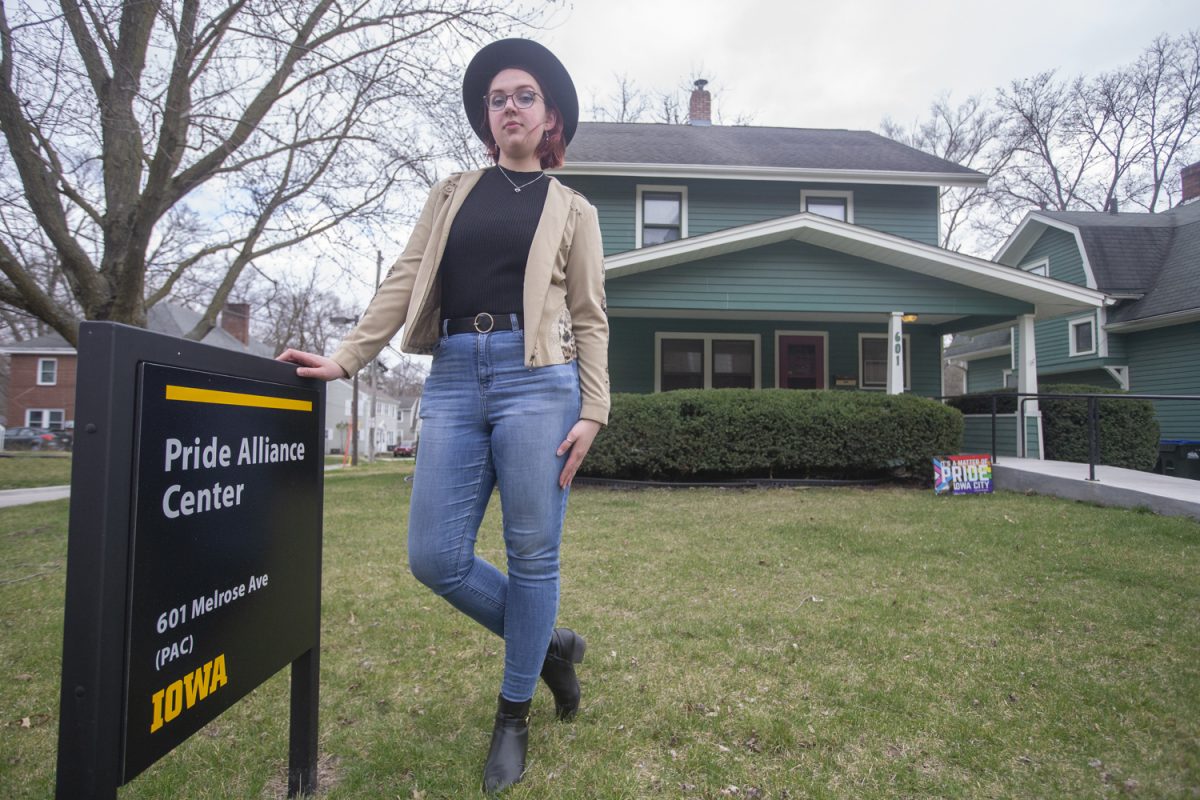Kae Vdovichenko, a third-year student at the University of Iowa, said their biggest fear as a teenager in high school was never growing up.
Their fear was based on the lack of LGBTQ+ elders they saw in their community. At the UI, Vdovichenko found a place while working with the UI’s Pride House and its staff, who prove that there is a future for young LGBTQ+ students.
With upcoming changes possibly impacting diversity, equity, and inclusion programming, UI students are concerned that previous resources and support will become limited on campus.
The Iowa Board of Regents approved recommendations on DEI programming that require the state’s public universities to restructure DEI-related departments and offices necessary for compliance and accreditation.
Since the recommendations were passed, the UI initiated a DEI task force to implement these directives. The university is waiting for the task force’s findings, which will be presented at the next regents meeting on April 24, and will find out how to proceed with DEI programs at the UI, public relations manager Steve Schmadeke wrote in an email to The Daily Iowan.
A regents document states that DEI study is not intended to prohibit any campus programs or activities, but instead review DEI services and positions that are deemed unnecessary by the board, along with ten other directives.
Changes on DEI programs accepted by the regents include:
- Restructuring of all DEI offices nonessential to compliance and accreditation.
- A review of all college, department, and unit-level DEI-related nonessential to compliance and accreditation
- Ensure that all DEI-related offices are available to all students and provide support for multicultural affairs and diversity.
- No employee, student, or other faculty member is required to state their pronouns upon application or submit a DEI statement.
- Development of regents policy stating admissions cannot be based on race
- A review of all DEI-related general education courses to ensure that students have a wide array of courses to choose from to fulfill their requirements
- Issuing standard employee guidance regarding separating personal political advocacy
- Exploration of recruitment strategies that advance diversity in faculty and staff pools
- Exploration, as amended at today’s meeting, of a proposal that would include free speech and civic education training
- Reminder issued by the regents on requirements in university websites
Changes to DEI programs are happening nationwide. The University of Texas at Austin and University of Florida recently cut DEI staff to comply with new state laws.
Vdovichenko said limiting DEI programs impacts more than just the students who currently seek out these services and spaces. They serve on the executive board of the UI student organization Queer Liberation Front and support the continuation of DEI programs on campus.
Having supportive spaces for LGBTQ+ students has helped them feel more comfortable on campus, Vdovichenko added, and they hope other students can benefit from similar spaces.
“It makes me feel at home and just having a place to be here on campus because there are times when I’m on campus and in some of my classes where I just don’t feel safe talking about my identity and, like, needing to perform my gender presentation,” Vdovichenko said.
Arianna Escandon, president of UI student organization Double Rainbow QPOC — which stands for Queer Trans People of Color — said having inclusive spaces on campus has been pivotal to their college experience.
Double Rainbow QPOC is a new student organization on campus that works to foster and create a welcoming space for LGBTQ+ people and people of color at the UI.
According to Escandon, the Double Rainbow works closely with multicultural and international student support and engagement, or MISSE. Double Rainbow is working with the Latino Native American Cultural Center and will soon work with the Asian Pacific Cultural Center.
RELATED: Regents president orders pause and review of Iowa’s public universities’ DEI programs
Escandon said DEI programming is beneficial for students, and it is important to accommodate underrepresented groups of students.
Escandon is not alone in this point of view. According to a 2022 campus climate survey, 88 percent of UI students and 83 percent of UI faculty agree that the university’s commitment to DEI is important to them.
Vdovichenko said finding queer safe spaces is difficult. But with DEI campus support, and student groups, such as the Queer Liberation Front, they feel represented.
“Having queer spaces on campus has been incredibly beneficial for me. It makes me feel at home and just having a place to be here on campus,” Vdovichenko said.
Fatima Salinas contributed to this report.



